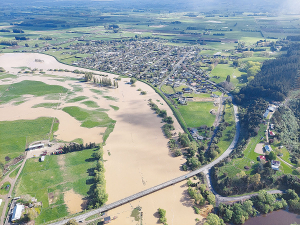Editorial: Having a rural voice
OPINION: The past few weeks have been tough on farms across the North Island: floods and storms have caused damage and disruption to families and businesses.
 Recovery following flooding in Otago rely on what happens in the next few months, says Luke Kane. Photo Credit: Otago Regional Council.
Recovery following flooding in Otago rely on what happens in the next few months, says Luke Kane. Photo Credit: Otago Regional Council.
A lot depends on what happens in the next few months. That's the view of Federated Farmers Otago president, Luke Kane.
He says a lot of the supplementary feed in the province has been used up but a few recent days of sunshine have offered some hope with feed utilisation improving.
"One this that's become apparent is that the arable guys have had a lot of rot in their crops. That has delayed planting for the next round, so that mean we may not see some of the effects of this for six months," he says.
Kane, a dairy farmer whose family has farmed in the region for over 100 years, says events like this are not uncommon, especially on the Taieri Plains, which is a flood scheme designed to take the pressure off the wider community.
He says the floodwaters are now starting to recede but remain on certain farms and may take time to disappear.
"Farmers in this area know they could be feeding out supplement for months because it will take time for them re-grass sodden paddocks," he says.
Kane says the problem for Otago farmers was the prolonged nature of the event which saw soil moisture levels rise and no sun to dry out the paddocks.
The World Wide Sires National All Day Breeds Best Youth Camp Best All Rounder plaudit has become family affair, with 2026 Paramount Cup winner Holly Williams following in her sister Zara's footsteps.
DairyNZ is giving New Zealand farmers a unique opportunity to gain hands-on governance and leadership experience within the dairy sector.
Herd improvement company LIC has posted a 5.2% lift in half-year revenue, thanks to increasing demand for genetics.
According to the latest Fresh Produce Trend Report from United Fresh, 2026 will be a year where fruit and vegetables are shaped by cost pressures, rapid digital adoption, and a renewed focus on wellbeing at home.
The Roar is a highlight of the game hunting calendar in New Zealand, with thousands of hunters set to head for the hills to hunt male stags during March and April.
OPINION: The past few weeks have been tough on farms across the North Island: floods and storms have caused damage and disruption to families and businesses.

OPINION: Meanwhile, red blooded Northland politician Matua Shane Jones has provided one of the most telling quotes of the year…
OPINION: This old mutt has been around for a few years now and it seems these ‘once in 100-year’ weather…